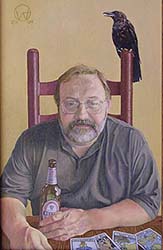Jeffrey Ford is most recently the author of The Shadow Year.

Listen: Play in new window | Download (Running Time: 57:04 — 52.3MB)
Condition of Mr. Segundo: Wondering why he isn’t invited to the Bowery Bar.
Author: Jeffrey Ford
Subjects Discussed: Writing a book representing a congeries of genre, the visceral advantages of not relying upon research, The Shadow Year‘s unnamed year and unnamed narrator, Botch Town as an urban facsimile, characters and facsimiles, blunt names, the risks of using real-life character composites in fiction, escaping into fantasy, the pros and cons of suburbia, the lost World War II survival mentality, parents who work multiple jobs, racism, authenticity and self-censorship, avoiding lectures in fiction, politically correct revisionism and contemporary literature, the racial epithets in Richard Price’s early novels, sticking to your own vision, bad food, spaghetti with thin tomato soup, mystery meat, powdered milk, living next to grandparents, the Mickey voice, television metaphors, hatred for Dick Van Dyke, messing with the colors when Star Trek aired, writing in short chapters, the dangers of being too succinct and too subtle, Perdo Shell in The Girl in the Glass and The Shadow Year, Sherlock Holmes, smelling the world vs. seeing the world, Mr. White, the advantages of playing Risk with tequila, Catholic symbolism, symbols that are unintentionally representative of America, identity within a coming-of-age story, Black Swan Green, reproducing handwriting within text, The Secret Life of Bees, keeping the subconscious in check, and writing what you really feel.
EXCERPT FROM SHOW:
Ford: Here’s the thing. We lived in an all-white community. Racism as far as whites against blacks was tantamount to this time. It was there. Everywhere. But it wasn’t discussed. Because it wasn’t an issue. I mean, we had, in the high school I went to, there was one black guy. You know what I mean? So it wasn’t the kind of thing that would come up. If it’s not the kind of thing that’s going to come up, I’m not going to talk about it in the book. Because I’m not giving fucking lectures here about the time period. I’m telling a story. This is what happened.
So I may at some time go back and talk about this. But I do remember times. I do remember my dad talking to me about this stuff, and really, actually going to great lengths to explain how this was wrong and what was right about this other thing. But if you didn’t have a guy like him telling me this, and you were a kid growing up in this situation, I mean, it’s going to take quite a bit to get over it when you got older. That’s what I think anyway. I don’t know.
Correspondent: But I guess I’m wondering, because I see this in contemporary literature. Just because you present this, it’s almost as if you run the risk of politically correct revisionism. I mean, if you read an early Richard Price novel and compare it to a more contemporary Richard Price novel, all of the terrible racial epithets have been wiped out. Expunged. And to me, this is an interesting question, in light of how true you must portray a certain time. If it was in your nursery rhymes, then don’t you have the need to convey this…
Ford: Well, you know, the thing about the Chinese thing in the nursery rhymes might have been in the book if I had written the scene better. It really goes back to me being — you know, how well I did it and how clunky the scene was with it. You know what I mean?
Correspondent: Yeah.
Ford: You know, if it was there and I thought it was a key issue at that time or something that would have come up in the story of it, I would definitely write it. The PC thing, I don’t think people really get excited about that as much when something’s presented honestly. There’s books that I’ve read that are pretty graphic about language and about epithets and stuff like that. And I don’t see a lot of people getting excited about it. And a lot of people are lauding these books as great books because there’s just an aura of honesty that’s wrapped around them.
(To listen to our previous conversation with Jeffrey Ford, go here.)
Listen: Play in new window | Download (Running Time: 57:04 — 52.3MB)
great interview – what a guy. never heard of him before.i’m buying the book.
great shows by the ways. i’m always tuned in …